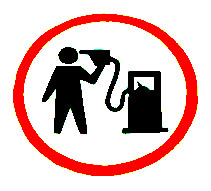 FORBES.COM
FORBES.COMMarc E. Babej and Tim Pollak 01.24.07, 12:55 PM ET
When Apple's stock jumps 15% on a product due out in six months, you expect big things. Really big things.
Is the new iPhone the next iPod for Apple shareholders?
Consensus among gadget gurus has it that the iPhone is a winning product, deftly blending the three most ubiquitous hand-held devices--cell phone, PDA and iPod--into one. It has an unusually wide screen and incorporates some clever new technology, such as the ability to display voice mail messages in a manner similar to e-mail. And, true to Apple (nasdaq: AAPL - news - people ) tradition, it has an undeniable cool factor.
But beauty, inside and out, does not necessarily make for commercial success. The big sticking point could be price: $499 to $599 with a two-year Cingular contract. Will consumers be willing to pay eight to nine times the average price of a cell phone, or two to three times the price of a smart phone, for Steve Jobs' new wonder phone?
Many analysts have examined the design and features of the iPhone and deemed them sufficient to justify the price tag. But there's another, potentially bigger cost issue here: switching networks, in terms of time and money. Buying a new computer or iPod is a straightforward product purchase. Buying a new iPhone, on the other hand, requires time, commitment and--at an industry standard of $175 to cancel an existing wireless carrier contract--a not insignificant amount of money. With a total real cost of $674 to $774, and potentially another $36 in activation charges, can the iPhone become a runaway hit to rival the iPod? There is room for doubt.
Consider: There are only three groups of people who wouldn't have to pay the $175 penalty--current Cingular customers, mobile phone users who are no longer under contract and people who do not yet have a mobile phone carrier (who are very unlikely to choose an iPhone as their first phone).
And that's just the financial part of the equation. For the iPhone to become a success, it has to be convincing enough to motivate consumers to (1) call their current carrier to cancel, (2) call Cingular, or visit one of their stores, to get a new phone and (3) commit to a two-year contract. For all of their grumbling about mobile carriers, consumers are quite reluctant to switch. When mobile phone numbers became portable last year, the industry anticipated rampant switching. So far, only about 7% have taken the plunge.
One thing Apple has done well in the past is control its own destiny, with a proprietary operating system and its own online music store. But there is no iPhone without a wireless carrier--in this case, without Cingular. And consumer behavior in the wireless carrier business is beyond the realm of Apple's experience.
Another component of Apple's success has been weak competition. Apple re-invented the portable music business, and no one has come close to challenging its real or perceived supremacy. Mobile phones are an entirely different matter. Apple is clearly an interloper and has given the competition fair warning of what's coming mid-year. They may not be able to match the iPhone feature for feature, but Motorola (nyse: MOT - news - people ) and Samsung are no Zen and Zune, and they surely can bring products to market that are just good enough to disincentivize switching.
Only time will tell if the iPhone will become the next iPod--or the next Newton (Apple's much-ballyhooed, high-priced 1990s handheld device that flopped, even though it was technologically superior to anything on the market at the time). The iPhone has a lot going for it, but its chances would be better if the road to success didn't require crossing the carrier barrier.
Marc E. Babej and Tim Pollak are partners at Reason Inc. , a marketing-strategy consulting firm that works with clients in a range of categories, including media and entertainment, financial and professional services, packaged goods and the public sector.


No comments:
Post a Comment